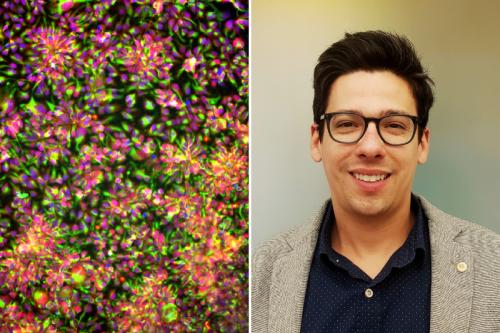
Michael F. Wells receives $1.5 million CIRM grant to identify risk factors for viral infections
Michael F. Wells, an assistant professor of human genetics at the David Geffen School of Medicine at UCLA and a member of the Eli and Edythe Broad Center of Regenerative Medicine and Stem Cell Research at UCLA, has received a $1.5 million grant from the California Institute for Regenerative Medicine to uncover the risk factors underlying viral infections of the fetal brain.
Increased presence of mosquito vectors coupled with an overall decrease in vaccination rates are putting more Americans at risk for viral diseases. While there are considerable differences among people in their susceptibility and response to infection, pinpointing the combination of factors including ancestry and sex that make up this variation has proven challenging. This is due in part to technical bottlenecks that limit researchers’ ability to account for the extensive genetic diversity that drives this difference in risk of viral infection.
Wells and his team are tackling this limitation by using their novel human stem cell-based cell village platform to screen large numbers of individual genetic lineages simultaneously. This system involves the pooling of cells from multiple different people into the same culture flask — equipping researchers with the ability to assess infection rates across many different genetic backgrounds by exposing a village to a virus.
By building a village composed of cells from 150 donors representing Hispanic/Latino, African American and European populations, the researchers aim to uncover how human genetic variation impacts susceptibility of the brain to Zika, dengue, cytomegalovirus and measles infections.
If successful, the project will uncover protective and risk biomarkers, identify new targets for antiviral therapies and potentially transform the way environmental risks in humans are studied.
“Individuals from non-European ancestries have historically been underrepresented in clinical trials and cell samples used in preclinical studies have lacked diversity as well,” Wells said. “As the personalized medicine revolution begins to take shape, it’s imperative that we ensure our findings are relevant to all people. Cell villages have the power to perform population-level analysis in vitro and could play a significant role in addressing societal issues like the health disparities experienced by women and ethnic minorities in the United States.”
